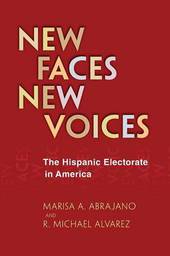
|
New Faces, New Voices: The Hispanic Electorate in America
Paperback / softback
Main Details
| Title |
New Faces, New Voices: The Hispanic Electorate in America
|
| Authors and Contributors |
By (author) Marisa Abrajano
|
|
By (author) R. Michael Alvarez
|
| Physical Properties |
| Format:Paperback / softback | | Pages:232 | | Dimensions(mm): Height 235,Width 152 |
|
| ISBN/Barcode |
9780691154350
|
| Classifications | Dewey:323.1168073 |
|---|
| Audience | | Tertiary Education (US: College) | | Professional & Vocational | |
|---|
| Illustrations |
2 Maps
|
|
Publishing Details |
| Publisher |
Princeton University Press
|
| Imprint |
Princeton University Press
|
| Publication Date |
25 March 2012 |
| Publication Country |
United States
|
Description
A comprehensive study of Hispanic voters in the United States. It paints a complex portrait of this diverse population. Examining race, politics, and comparative political behavior, it discusses the concept of Hispanic political identity, taking into account the ethnic, generational, and linguistic distinctions within the Hispanic population.
Author Biography
Marisa A. Abrajano is associate professor of political science at the University of California, San Diego. She is the author of "Campaigning to the New American Electorate." R. Michael Alvarez is professor of political science at the California Institute of Technology. He is the coauthor of "Electronic Elections" and "Hard Choices, Easy Answers" (both Princeton).
Reviews"New Faces, New Voices successfully gives voice to the new Hispanic voter and clearly illustrates the importance of a diverse and growing population. The book is an invaluable addition to both ethnic studies and political behavior literature."--Choice "New Faces, New Voices offers a great deal of analysis in a relatively small package. Consequently, it will serve as a resource for upper-division classes in Latino politics, race and ethnic politics, and US. Political behavior."--Louis De Sipio, American Review of Politics "Because of the quality of the research presented in this book, it can be recommended as an innovative approach to studying Hispanic voting behavior in the United States. It also sheds light on the complexity of this issue and on new ways of studying ethnic political behavior."--Ksenia Krauer-Pacheco, CEU Political Science Journal
|